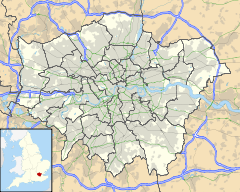- Neasden tube station
-
Neasden 
Location of Neasden in Greater LondonLocation Neasden Local authority Brent Managed by London Underground Number of platforms 4 Fare zone 3 London Underground annual entry and exit 2008  2.990 million[1]
2.990 million[1]2009  2.854 million[1]
2.854 million[1]2010  2.660 million[1]
2.660 million[1]1880 Opened April 1958 Goods yard closed[2] List of stations Underground · National Rail Coordinates: 51°33′15″N 0°15′01″W / 51.5542°N 0.2503°W
Neasden Underground station is a London Underground station in Neasden. It is on the Jubilee Line, between Wembley Park and Dollis Hill. Metropolitan Line trains pass through the station but do not stop, except on rare occasions. The Chiltern Main Line/London to Aylesbury Line runs to the west of the station.
Contents
Overview
The station opened on 2 August 1880 as part of the ongoing extensions to the Metropolitan Railway (this time to Harrow), with the name Kingsbury and Neasden. The name was changed to Neasden and Kingsbury in 1910, and then changed again to its current name Neasden in 1932, the same year Kingsbury station opened. After the nationalisation of the Met in 1933, train services to Stanmore were transferred to the new eastern branch of the Bakerloo Line in 1939 and Metropolitan Line trains ceased to stop at the station the following year. In 1979, the main service was transferred to the Jubilee Line.
The station's surface building is located in Neasden Lane. As well as the ticket office there are 3 ticket collection barriers and a single luggage gate (these were installed in the late 1990s; prior to this there were no barriers and just a gate), and the station also has a shop. The stairs from the surface building lead to 4 platforms. Platforms 1 and 4 are on the Metropolitan Line, served on a few days a year for local events and when necessary due to disruptions to normal services. Platforms 2 and 3 were the Northbound and Southbound platforms for the Bakerloo Line and since 1979 are now used by the Jubilee Line. The platforms are constructed to "transition height" to allow regular use by tube trains of the Jubilee Line and occasional (early morning, late night and during work on the line) use by the larger Metropolitan Line trains.
Platforms 1, 2 and 3 were built originally in 1880. Neasden had 3 platforms, which was unusual for a small station. The reason for 3 platforms was that Neasden was a terminus for many local Metropolitan trains from London and which would be stabled in the nearby depot. Platforms 4 and 5 were built in 1914 as a result of the quadrupling of the Metropolitan between Finchley Road and Harrow-on-the-Hill. Platform 5 was used as a bay platform for trains terminating at Neasden from stations north on the Met such as Stanmore. This platform was removed later on and the track is now used as a relief siding for the depot.
Neasden is one of the few stations on the southern section of the former Metropolitan Mainline to still have its original platform buildings intact and its architecture is typical for a station serving a medium sized village. Baker Street and Willesden Green are the other stations to have their platform buildings intact. The line between Finchley Road and Harrow-on-the-Hill was quadrupled between 1914–1916, and many intermediate stations had to be rebuilt to enable the fast lines to be built. Jubilee Line trains sometimes terminate at Neasden.
Nearby attractions
- Neasden Temple
- Wembley Stadium
Other transport links
One London bus route serves Neasden tube station: 297. The 297 bus is a 24hr service which runs between Willesden Bus Garage and Ealing Broadway. The bus also stops outside of Wembley Park tube station, a short distance away from Wembley Stadium and Wembley Arena. In 2008 it was proposed that the North and West London Light Railway could serve the station.[3]
Gallery
References
- ^ a b c "Customer metrics: entries and exits". London Underground performance update. Transport for London. 2003-2010. http://www.tfl.gov.uk/tfl/corporate/modesoftransport/tube/performance/default.asp?onload=entryexit. Retrieved 8 May 2011.
- ^ Hardy, Brian, ed (March 2011). "How it used to be - freight on The Underground 50 years ago". Underground News (London Underground Railway Society) (591): 175–183. ISSN 0306-8617.
- ^ "Reducing Car Use: Proposals for a Brent Cross Railway". London Campaign for Better Transport. 2008. http://www.bettertransport.org.uk/system/files/Brent_Cross_rail_proposal.pdf. Retrieved 16 December 2009.
Preceding station  London Underground
London UndergroundFollowing station towards StanmoreJubilee line towards StratfordMetropolitan line No regular service
Regular service (1880-1939)towards Baker Street or AldgateFormer services Preceding station  London Underground
London UndergroundFollowing station towards StanmoreBakerloo line Stanmore branch (1939-1979)towards Elephant & CastleJubilee line Stations Baker Street · Bermondsey · Bond Street · Canada Water
 · Canary Wharf
· Canary Wharf  · Canning Town
· Canning Town  · Canons Park · Dollis Hill · Finchley Road · Green Park · Kilburn · Kingsbury · London Bridge
· Canons Park · Dollis Hill · Finchley Road · Green Park · Kilburn · Kingsbury · London Bridge  · Neasden · North Greenwich · Queensbury ·
· Neasden · North Greenwich · Queensbury ·
Southwark ( Waterloo East) · St John's Wood · Stanmore · Stratford
Waterloo East) · St John's Wood · Stanmore · Stratford 

 · Swiss Cottage · Waterloo
· Swiss Cottage · Waterloo  · Wembley Park · West Ham
· Wembley Park · West Ham  · West Hampstead
· West Hampstead 
 · Westminster · Willesden Green
· Westminster · Willesden Green

Click to enlargeRolling stock History Former linesFormer stationsFormer rolling stockCategories:- Rail transport stations in London fare zone 3
- Jubilee Line stations
- Tube stations in Brent
- Former Metropolitan Railway stations
- Railway stations opened in 1880
Wikimedia Foundation. 2010.






